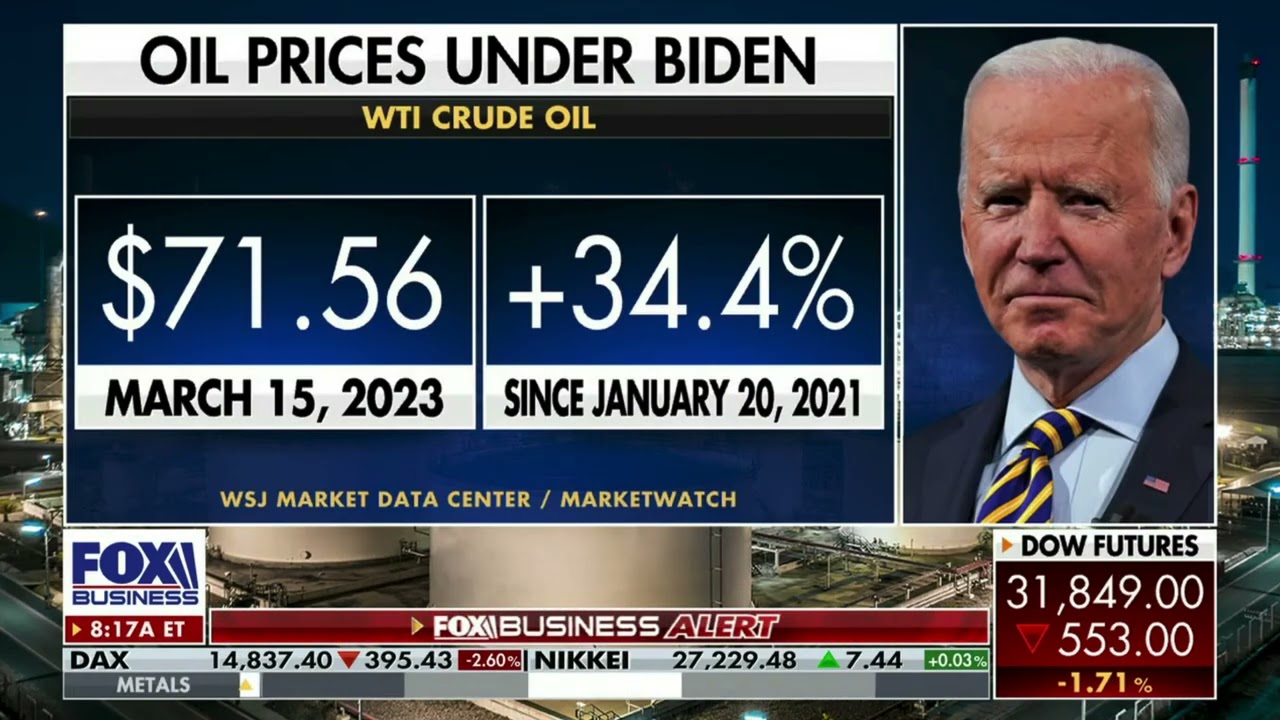WASHINGTON, D.C. — Today, House Majority Leader Steve Scalise (R-La.) appeared on Fox Business Network’s Mornings with Maria to discuss restoring energy independence to America and fiscal responsibility to Washington. Leader Scalise highlighted how H.R. 1, the Lower Energy Costs Act, will reduce expenses across the board for American families by promoting all types of American energy production instead of relying on foreign countries. Additionally, Leader Scalise slammed President Biden’s Energy Secretary Jennifer Granholm for saying America has something to learn from China on energy, when we produce energy cleaner than anywhere else in the world. Leader Scalise also pointed to how President Biden’s reckless inflationary spending contributed to the Silicon Valley Bank collapse, and described how House Republicans are working to get control over Washington’s spending.
On H.R. 1, the Lower Energy Costs Act:
“You know, when Speaker McCarthy and I were talking about what the top bill would be and, you know, we ran on a commitment to America. We laid out to the country [that] we wanted to get our economy back on track, address inflation, which clearly is one of the big driving factors behind what you saw at Silicon Valley Bank, along with mismanagement. But we also said energy security is really at the heart of that. We’ve been talking about getting our country back on track from an energy security standpoint.
“And so H.R. 1, the Lower Energy Cost Act, is really focused on helping America be energy independent again, lowering costs for families by making our own energy. We shouldn’t be dependent on foreign countries. You’ve talked about this a lot. You know what the problems are. Let’s streamline the permitting process. Let’s build more energy infrastructure like pipelines, which [President] Biden, of course, day one killed Keystone, blocked a lot of other projects on pipelines. Let’s have lease sales, where you have certainty, where you know you can invest in the United States instead of foreign countries.”
On if House Republicans can get this legislation past President Biden:
“Look, we’ve seen this with other examples. We just sent a bill to [President Biden’s] desk last week dealing with crime in D.C. where initially President Biden came out against it. Crime’s out of control in D.C. We said why should you be letting people who are hardened criminals walk scot free, and we sent the bill to his desk. And after we sent it, he was initially against it. Now, he said he’ll sign the bill.
“I think when the country sees how smart energy policy can lower costs for them, not just at the pump, where the prices are 40 percent higher since [President] Biden took office, but household electricity costs are double digits higher. It’s one of the reasons you’re paying more at the grocery store. So I think if the public gets engaged in this issue, like they are on crime, I think we have a chance of getting this done.
“But it starts with passing in the House and having a full debate. In two weeks, this bill is going to be on the House Floor. You’ve got the Energy and Commerce Committee, Natural Resources, and Transportation Committee all involved in putting this package together and it’s going to show the country how we can be energy independent, even though a lot of Biden Administration officials, like his own Energy Secretary, have no idea how to do this. We’re going to show the country how it can be done better than anywhere else in the world, and then let the country get involved.”
On President Biden’s Energy Secretary saying America needs to learn from China on energy:
“Well, what they need to learn is about energy policy and about sanity. I mean, ‘Is anybody competent in the Biden Administration?’ I think is a question we should be asking. But [Chairwoman] Cathy McMorris Rogers and [Rep.] Jeff Duncan and [Rep.] Bill Johnson on the Energy and Commerce Committee just Monday sent a letter to the Energy Secretary Granholm, saying, ‘You’ve got to come before our committee on energy and commerce and explain yourself – What do you mean we should learn from China?’
“China, frankly, should be following our role as every other country should. We’re the cleanest country in the world to make things. And by [President] Biden shutting down America, he’s sending more jobs to China. By the way, they’re building a coal plant every week and increasing emissions. We were reducing carbon emissions in America while being energy independent.”
On if President Biden’s potential approval of the Willow Project is a pivot in his energy policy:
“I haven’t seen a pivot. You know, they may have scaled it down some. But at the end of the day, you’re not seeing consistency in permitting, or in leasing. And so what that means is a lot of investments going overseas for long term projects. And [President] Biden even in his State of the Union indicated maybe just 10 more years we’re going to need oil. Nobody believes that, by the way.
“We’re going to need all sources of energy. Let’s advance wind and solar. They’re surely not ready for primetime today. They’re going to continue to develop, but we’re going to need oil, natural gas. We’re going to need nuclear power. Why is [President] Biden shutting all of that down?”
On the collapse of Silicon Valley Bank:
“What I have seen, there are a lot of very valid questions being raised about the management at Silicon Valley Bank, but also the supervision. You know, because a regulator is only as good as their ability to actually do their job, and did the regulators end up getting asleep at the wheel. When you look at some of the fundamentals, the way that they were making investments at Silicon Valley Bank, versus the type of people that were putting their money in uninsured deposits over there, didn’t really match up.
“And frankly, you don’t see that un-diversification, lack of diversification, at a lot of other banks. I’ve talked to a lot of the small and medium sized banks in Southeast Louisiana. They don’t have those same kind of problems that a few of these banks that are in trouble have, so it’s not a system wide problem, but frankly it’s the checks coming due from two years of President Biden’s reckless spending that drove inflation, that drove interest rates.
“A lot of people said the Fed was late in the game and then when they got in the game, they started raising rates too much too fast, as opposed to catching it early off, because they just kept spending trillions and trillions of dollars, doing things like paying people not to work. It made no sense. It’s one of the reasons why the majority in the House, it’s why we need to restore fiscal sanity in Washington.”
On House Republicans fighting for fiscal responsibility:
“Look, common sense has to be re-injected back into Washington. I think that’s the one thing that was missing the most in the last two years. And so the debt ceiling negotiation really is where this comes to a head because we said we’ve got to get control over spending.
“The real problem is, when you talk trillions and trillions of dollars, people lose sight of these huge numbers. How about this for real numbers: for every dollar that Washington takes in, Washington is spending $1.29. That can’t sustain itself. It wouldn’t work for a business, surely wouldn’t work for a family, can’t work for Washington, either.
“And so in these negotiations with the debt ceiling – and Speaker McCarthy laid it out early: When the President said he just wants a blank check, he maxed out the nation’s credit card by racking up spending for two years – we’re not going to give him another credit card and say go max this one out too. We’ve got to have a conversation about how to get control over spending, so you can bring that dollar $1.29 back down closer to a dollar out for a dollar coming in. That’s going to be part of these negotiations.
“The good news is, we’ve laid out real clearly to the President that as we talk about raising the debt ceiling, it’s got to be in conjunction with getting control over spending. And the President doesn’t want to put anything on the table. We’ve looked at a number of things, things like just welfare reform, stop paying people not to work – that’s hundreds of billions of dollars.”


